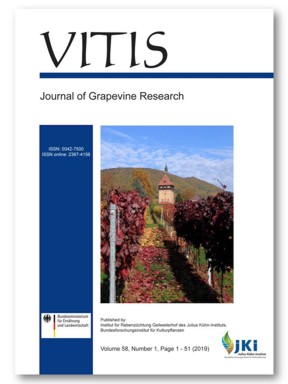Efficacy of selected volatile compounds for organic vine mealybug control
DOI:
https://doi.org/10.5073/vitis.2019.58.1-6Keywords:
Vitis vinifera; Planococcus ficus; biopesticides; vineyard protection; natural products.Abstract
Planococcus ficus (Signoret) (Hemiptera: Pseudo-coccidae) constitutes a high impact pest in vineyards. Synthetic insecticides are inefficient to control the mealybug population and they affect human health and the environment. The insecticidal properties of eight volatile compounds against vine mealybugs and their grapevine leaf phytotoxicity in laboratory conditions were evaluated. 2-decanone, 3-decanone, α-methyl cinnamaldehyde and cinnamaldehyde produced a higher percentage of mealybug mortality in relation to control at a fumigant dose of 300 µL·L-1 air. The 3-octanone, cinnamyl chloride, 1-octen-3-ol and 3-octanol were not effective against P. ficus. Cinnamaldehyde and α-methyl cinnamaldehyde produced a low acetylcholinesterase inhibition (IC50= 2.67 µL·L-1 and 9.10 µL·L-1, respectively), whereas 2-decanone and 3-decanone did not cause enzyme inhibition. Cinnamaldehyde was not phytotoxic for grapevine leaves; therefore, this compound was selected for a contact application to improve its effectiveness, resulting in a LC50 of 394.36 µL·L-1 solution. The results demonstrated the potential of cinnamaldehyde to be developed as a non-phytotoxic natural insecticide for the control of vine mealybugs in vineyards.
Downloads
Published
Issue
Section
License
The content of VITIS is published under a Creative Commons Attribution 4.0 license. Any user is free to share and adapt (remix, transform, build upon) the content as long as the original publication is attributed (authors, title, year, journal, issue, pages) and any changes to the original are clearly labeled. We do not prohibit or charge a fee for reuse of published content. The use of general descriptive names, trade names, trademarks, and so forth in any publication herein, even if not specifically indicated, does not imply that these names are not protected by the relevant laws and regulations. The submitting author agrees to these terms on behalf of all co-authors when submitting a manuscript. Please be aware that this license cannot be revoked. All authors retain the copyright on their work and are able to enter into separate, additional contractual arrangements.



